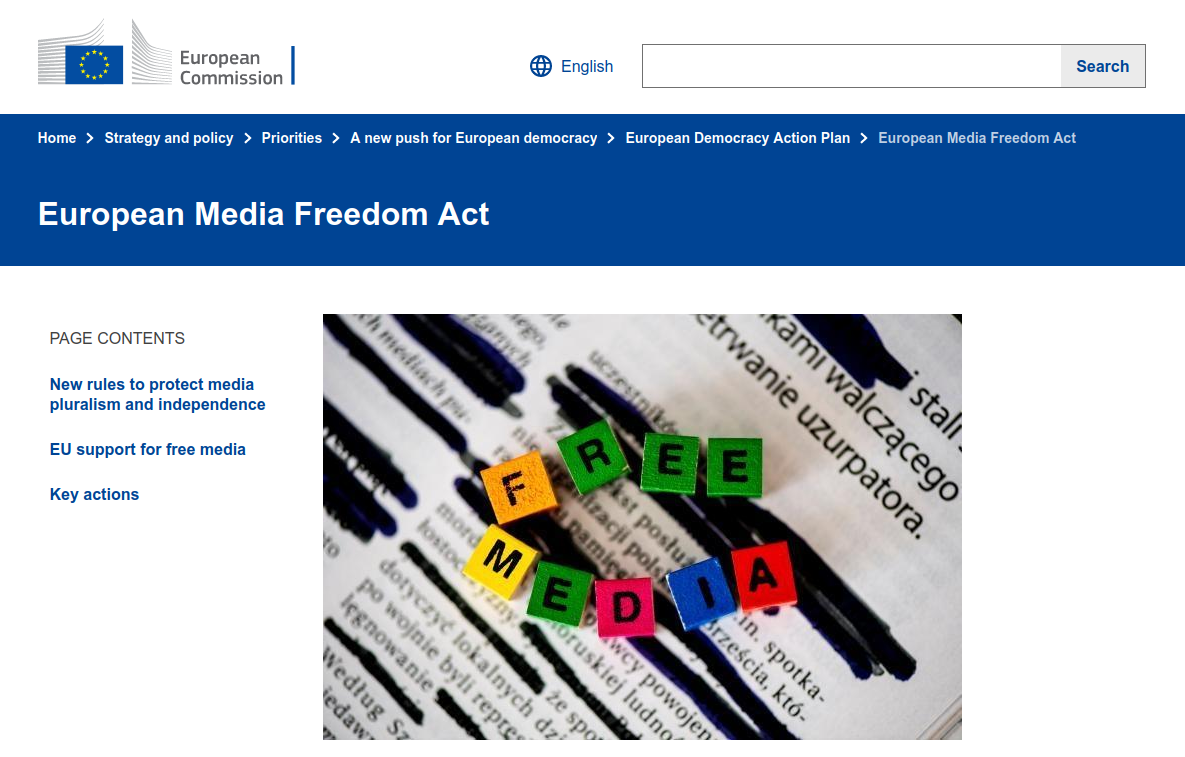Will the New European Media Freedom Act Mean Freedom to Spy on Journalists and Spread Disinformation?

The European Union’s important new law, the European Media Freedom Act (EMFA), is likely to have an impact well beyond the EU’s borders. Unfortunately, that impact will be negative in two important respects – the spread of disinformation, and the surveillance of journalists – unless last-minute changes are made.
The EMFA is the latest in a series of wide-ranging EU laws that aim to create new rules for the online world. These include:
- The Digital Services Act
- The Digital Markets Act
- The Artificial Intelligence Act
- The Data Act
The EMFA’s stated intentions are laudable: to protect media freedom and pluralism, and to shield journalists from outside interference or surveillance. However, during the debates on the proposed law, a reasonable idea to prevent “very large online platforms” (VLOPs) like X (formerly Twitter) and Facebook from arbitrarily removing material published on their platforms has turned into an extremely dangerous one.
What Are the Issues with the EMFA?
The current text would allow organizations to self-declare as media service providers, which are accorded a special media privilege under the EMFA. Any material placed by a media service provider on a VLOP platform cannot be taken down immediately, down-ranked, blurred, or labelled. Instead, the platform must inform the media outlet and attempt to find an “amicable solution” to the problem. VLOPs must wait 24 hours before content can be removed.
This would allow organizations that have self-certified as media service providers to publish disinformation on a VLOP that legally could not be taken down for 24 hours, effectively creating an unprecedented “must-carry” obligation for the platform. The fact the disinformation could be removed after 24 hours essentially becomes irrelevant: at that point, the lies have been sown, and the damage has been done. No number of later clarifications or warnings will undo that harm.
Why Does It Matter?
The introduction of this media privilege and the creation of a must-carry obligation is extraordinary for a number of reasons. First is the sheer volume of disinformation that’s already circulating, and the evident difficulties of trying to stem the flow. For the EMFA to make it not just harder but actually illegal for VLOPs to take down such false or harmful material is perverse.
It’s particularly interesting because the inability to remove harmful content for 24 hours undermines the EU’s own recently passed Digital Services Act. The latter already tackles arbitrary moderation systems and regulates the power imbalance between VLOPs and media outlets. Introducing an ill thought-out media exemption at the last minute is bad policy-making that will affect not just the EU, but everyone online. It will also make it easier to propagate lies and disinformation in the EU, which will inevitably spread beyond the region and across the internet.
The introduction of a must-carry obligation also means that media service providers become a privileged class online, with a special power to post harmful information that is denied to everyone else, notably smaller, newer publishers. This is a gross distortion of the online environment in the EU, which will once more have serious repercussions outside that region because of the internet’s global nature.
The other glaring problem with the current text of the EMFA concerns surveillance of journalists. One of the promises of the new law when it was unveiled was “No use of spyware against media – the Media Freedom Act includes strong safeguards against the use of spyware against media, journalists and their families.” The Vice-President for Values and Transparency, Věra Jourová, said “no journalist should be spied on because of their job.” That seems unequivocal. But here’s what the European Parliament has just agreed:
MEPs want to ban all forms of interference in the editorial decisions of media outlets and prevent external pressure being exerted on journalists, such as forcing them to disclose their sources, accessing encrypted content on their devices, or targeting them with spyware.
The use of spyware may only be justified, MEPs argue, as a ‘last resort’ measure, on a case-by-case basis, and if ordered by an independent judicial authority to investigate a serious crime, such as terrorism or human trafficking.
The promise of “No use of spyware against media” has become “Some use of spyware against media.” Specifically, the governments of EU nations want to be able to spy on reporters in the name of “national security” – an excuse for granting exceptional powers to the authorities that is frequently abused. The EU’s own European Data Protection Supervisor wrote in his Preliminary Remarks on Modern Spyware:
“National security” cannot be used as an excuse to an extensive use of such [spyware] technologies nor as an argument against the involvement of the European Union.
At least 180 journalists from 21 countries have been targeted with Pegasus spyware, according to the investigative site Forbidden Stories. This backtracking on banning all use of spyware against the media also coincides with Amnesty International releasing a report about the widespread deployment of the powerful Predator spyware. The report claims that “Shocking spyware attacks have been attempted against civil society, journalists, politicians and academics in the European Union (EU), USA and Asia.”
The EMFA is a unique opportunity to provide powerful legal tools to tackle spyware attacks against journalists. There is a still a chance for that to happen during the negotiations of the final text that are taking place, and for the pernicious media privilege article to be removed. If those last-minute changes aren’t made, the well-intentioned new European Media Freedom Act will turn out to mean freedom to spread disinformation, and freedom to spy on journalists.
Featured image by European Commission.
